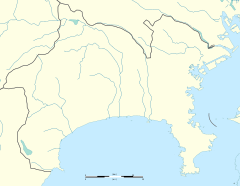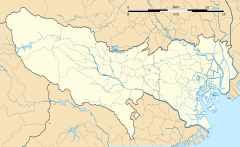Musashi-Kosugi Station(Võ tàng tiểu sam dịch,Musashi-Kosugi-eki)is a pair of physically separated interchange passengerrailway stations,a block from each other, located inNakahara Wardof easternKawasaki, Kanagawa,Japan, operated byEast Japan Railway Company(JR East) and theprivate-sectorrailway operatorTokyu Corporation.Note that the termJR East Musashi-Kosugi Stationis non-specific, the physical buildings of the Yokosuka and Nambu lines run by the same company are some 400 meters away, connected by a passageway.
Musashi-Kosugi Station Võ tàng tiểu sam dịch | |||||
|---|---|---|---|---|---|
 JR East Musashi-Kosugi Station, north exit | |||||
| General information | |||||
| Location | Nakahara,Kawasaki, Kanagawa Japan | ||||
| Coordinates | 35°34′33″N139°39′35″E/ 35.575736°N 139.659665°E | ||||
| Operated by | |||||
| History | |||||
| Opened | 1927 | ||||
| |||||
Area layout
editThere are essentially two complexes that make up Musashi-Kosugi Station, with a 400-meter connector passageway between them. The western complex contains a Nambu Line JR East station and a Tokyu station in one building. The eastern station is part of the Tokaido Line and contains JR East Yokosuka Line as well as Shinkansen tracks, though the Shinkansen tracks have no stop. Although it is common to name stations after their operator, the termJR East Musashi-Kosugi Stationis therefore non-specific as JR East services both complexes.
Lines
editMusashi-Kosugi Station is served by JR East'sNambu Line,Yokosuka Line,andShōnan-Shinjuku Line,as well as Tokyu'sTōyoko LineandMeguro Line.
JR East
editMKGJN07JO15JS15 Musashi-Kosugi Station Võ tàng tiểu sam dịch | |||||||||||||||||||||||||||||||||||||||||||||||
|---|---|---|---|---|---|---|---|---|---|---|---|---|---|---|---|---|---|---|---|---|---|---|---|---|---|---|---|---|---|---|---|---|---|---|---|---|---|---|---|---|---|---|---|---|---|---|---|
| JR East station | |||||||||||||||||||||||||||||||||||||||||||||||
JR Musashi-Kosugi Station exit | |||||||||||||||||||||||||||||||||||||||||||||||
| General information | |||||||||||||||||||||||||||||||||||||||||||||||
| Location | 3-492 Kosugimachi, Nakahara-ku, Kawasaki-shi, Kanagawa-ken ( thần nại xuyên huyện xuyên kỳ thị trung nguyên khu tiểu sam đinh 3-492 ) Japan | ||||||||||||||||||||||||||||||||||||||||||||||
| Operated by | JR East | ||||||||||||||||||||||||||||||||||||||||||||||
| Line(s) | |||||||||||||||||||||||||||||||||||||||||||||||
| Distance | 16.8 km (10.4 mi) fromTokyo | ||||||||||||||||||||||||||||||||||||||||||||||
| Platforms | 1island+ 2side platforms | ||||||||||||||||||||||||||||||||||||||||||||||
| Connections | Bus terminal | ||||||||||||||||||||||||||||||||||||||||||||||
| Other information | |||||||||||||||||||||||||||||||||||||||||||||||
| Status | Staffed (Midori no Madoguchi) | ||||||||||||||||||||||||||||||||||||||||||||||
| History | |||||||||||||||||||||||||||||||||||||||||||||||
| Opened | 1 April 1944 | ||||||||||||||||||||||||||||||||||||||||||||||
| Passengers | |||||||||||||||||||||||||||||||||||||||||||||||
| FY2019 | 129,194 daily | ||||||||||||||||||||||||||||||||||||||||||||||
| |||||||||||||||||||||||||||||||||||||||||||||||
Station layout
editJR Musashi-Kosugi Station has two opposedside platformsserving the two tracks (Platform 1 and Platform 2) of the Nambu Line and twoside platformsserving the two tracks (Platform 3 and Platform 4) of the Yokosuka Line. The Shōnan-Shinjuku Line andNarita Expressshare the Yokosuka Line platforms. The two sections of the JR station are located separately and connected by a 400 m long passage. All platforms are elevated, as is the station building. The station has aMidori no Madoguchistaffed ticket office.
Platforms
edit| 1 | JNNambu Line | forMukaigawara,Yakō,andKawasaki |
| 2 | JNNambu Line | forMusashi-Mizonokuchi,Noborito,andTachikawa |
| 3 | JOYokosuka Line | forYokohama,Ōfuna,Zushi,andKurihama |
| JSShōnan-Shinjuku Line | for Yokohama, Zushi, andOdawara □Saphir OdorikoforAtamiandIzukyū-Shimoda | |
| Through toSōtetsu Shin-Yokohama Line | forHazawa yokohama-kokudai Sotetsu Line forNishiyaandFutamata-gawa | |
| 4 | JOYokosuka Line | forTokyo,Chiba,and Narita Airport (Terminal 2·3andTerminal 1) □Narita Expressfor Narita Airport |
| JSShōnan-Shinjuku Line | forŌsaki,Shinjuku,Ikebukuro,Ōmiya,TakasakiandUtsunomiya □Saphir Odorikofor Shinjuku and Ikebukuro | |
| JAThrough toSaikyō Line | for Ōsaki and Shinjuku |
-
Nambu Line platforms
-
Platforms 3 and 4 on the Yokosuka Line
-
Updated platform 3 (opened in December 2022)
Tokyu
editTY11MG11 Musashi-Kosugi Station Võ tàng tiểu sam dịch | |||||||||||||||||||||||||||||||||||||||
|---|---|---|---|---|---|---|---|---|---|---|---|---|---|---|---|---|---|---|---|---|---|---|---|---|---|---|---|---|---|---|---|---|---|---|---|---|---|---|---|
| Tokyu station | |||||||||||||||||||||||||||||||||||||||
Tokyu Musashi-Kosugi main entrance | |||||||||||||||||||||||||||||||||||||||
| General information | |||||||||||||||||||||||||||||||||||||||
| Location | 3-472 Kosugimachi, Nakahara Ward, Kawasaki City, Kanagawa Prefecture Japan | ||||||||||||||||||||||||||||||||||||||
| Operated by | Tōkyū Railways | ||||||||||||||||||||||||||||||||||||||
| Line(s) | |||||||||||||||||||||||||||||||||||||||
| Distance | 9.1 km (5.7 mi) fromMeguro | ||||||||||||||||||||||||||||||||||||||
| Platforms | 2 island platforms | ||||||||||||||||||||||||||||||||||||||
| Other information | |||||||||||||||||||||||||||||||||||||||
| Station code | TY11, MG11 | ||||||||||||||||||||||||||||||||||||||
| History | |||||||||||||||||||||||||||||||||||||||
| Opened | 16 June 1945 | ||||||||||||||||||||||||||||||||||||||
| Passengers | |||||||||||||||||||||||||||||||||||||||
| FY2019 | 223,256 daily | ||||||||||||||||||||||||||||||||||||||
| Services | |||||||||||||||||||||||||||||||||||||||
| |||||||||||||||||||||||||||||||||||||||
Station layout
editTokyu Musashi-Kosugi Station has twoisland platformsserving four tracks. The outer tracks (Platform 1 and Platform 4) are used by the Tokyu Toyoko Line, and the inner tracks (Platform 2 and Platform 3) are used by the Tokyu Meguro Line. All platforms are elevated, as is the station building.
Platforms
edit| 1 | TYTokyu Toyoko Line |
|
| 2 | MGTokyu Meguro Line |
|
| 3 | MGTokyu Meguro Line | forŌokayamaandMeguro NNamboku LineforAkabane-iwabuchi SRSaitama Rapid Railway LineforUrawa-misono IMita LineforNishi-takashimadaira |
| 4 | TYTokyu Toyoko Line | forJiyūgaoka,Naka-Meguro,andShibuya FFukutoshin LineforShinjuku-sanchome,Ikebukuro,Kotake-mukaihara,andWakoshi Seibu Ikebukuro LineforHannō TJTōbu Tōjō LineforShinrinkōen |
-
Tokyu platforms seen in 2015
-
A Tokyu trainset departs the station
History
editThis sectionneeds additional citations forverification.(September 2014) |
The area around the station was served by the Nambu and Toyoko lines since the 1920s, but over an extended period of time it was integrated as Musashi-Kosugi Station in 1945. Since then, the station has functioned as a major transfer point for people residing in Kawasaki (along the Nambu Line) who commute to Tokyo.
Although the station was already a major station along the two lines in the 1990s, the station started further expansion of its role when the Meguro Line opened in 2000 with direct service to the Tokyo subway lines. The 2010 opening of the new platform for theYokosuka LineandShōnan-Shinjuku Lineconnected the station with many directions in Kantō region, includingNarita Airport.
Musashi-Kosugi Station opened as Ground-mae Stop(グラウンド tiền đình lưu tràng,Guraundomae-Teiryūjō)and as Musashi-Kosugi Stop(Võ tàng tiểu sam đình lưu tràng,Musashi-Kosugi-Teiryūjō)on the Nambu Railway on 1 November 1927. The nearby Kōgyōtoshi Station(Công nghiệp đô thị dịch,Kōgyōtoshi-eki)on the Toyoko Line opened on 11 December 1939. The Nambu Railway wasnationalizedon 1 April 1944, becoming part of into theJapanese Government Railway(JGR) system. Ground-mae Stop became Musashi-Kosugi Station, and the former Musashi-Kosugi Stop was abolished. After the end ofWorld War II,JGR became theJapanese National Railways(JNR). On 16 June 1945, Musashi-Kosugi Station on the Toyoko Line opened, and on 31 March 1953, Kōgyōtoshi Station was abolished.
On 27 November 1988, grade separation work removed the level crossings on Tachikawa-bound tracks, and by 27 December 1988, grade separation work removed the level crossings on Kawasaki-bound tracks. Along withprivatizationand division of JNR,JR Eaststarted operating the former JNR portion of the station on 1 April 1987. On 6 August 2000, the Tokyu Meguro Line opened; the line was extended to connect to the Tokyu Meguro Line on 22 June 2008. The station was further expanded on 13 March 2010, when Yokosuka Line and Shōnan-Shinjuku Line trains began stopping.
Station numbering was introduced on all Tokyu Railway lines during fiscal 2012, with Musashi-Kosugi Station becoming "TY11" for the Toyoko Line and "MG11" for the Meguro Line.[1]
Platform screen doorson the Nambu Line platforms were installed on 2 February 2022 and began operation on 13 March 2022.[2]
On 18 December 2022, platform 3 on the Yokosuka Line was transitioned to a new side platform.[3]Construction of the platform had been in progress since 2020.[4]Under the updated configuration, the platform number assignments remain as-is.
Passenger statistics
editIn the 2015 data available from Japan’s Ministry of Land, Infrastructure, Transport and Tourism, Musashi Kosugi → Nishi-Ōi was one of the train segments among Tokyo's most crowded train lines during rush hour.[5]
In fiscal 2019, the JR station was used by an average of 129,194 passengers daily (boarding passengers only).[6]Passenger usage for the JR East station has almost doubled since fiscal 1999, when the station was the 61st-busiest JR East station with an average of 64,165 passengers daily.[7]
In fiscal 2019, the Tokyu Toyoko Line station was used by an average of 173,414 total passengers daily and the Meguro Line station was used by an average of 49,842 total passengers daily.[8]
The daily passenger figures (boarding passengers only) for each operator in previous years are as shown below.
| Fiscal year | JR East | Tokyu | |
|---|---|---|---|
| 2005 | 70,685 | 92,120 | [9] |
| 2010 | 99,617 | 95,668 | [10] |
| 2015 | 124,325 | 108,191 | [11] |
Surrounding area
editThe area had until the late 2000s been a rather nondescript 'endless' suburbia, broken up only by theTama River.At that time, the locals called the areaMusako.However, with skyscraper construction giving the area an urban feel and outsider influx, the new local nicknameKosugihas emerged.[12]The termMusashirefers toNambu Line,the first train line through the area, which the line name itself is a reference to formerMusashi Province,the southern rim which the line runs along. According to surveys, the district is considered among the more desirable in the Tokyo area, but its popularity waned somewhat after the area suffered flooding due toTyphoon Hagibisin October 2019.[13]
- Nippon Medical SchoolMusashi-kosugi Campus
- Nippon Medical University Musashi Kosugi Hospital
- Todoroki Ryokuchiathletic park
See also
editReferences
edit- ^Đông cấp tuyến toàn dịch で dịch ナンバリングを đạo nhập します[Station numbering to be introduced at all Tokyu stations](PDF).News Release(in Japanese). Japan: Tokyū Corporation. January 26, 2012.Retrieved7 September2014.
- ^"Nam võ tuyến võ tàng tiểu sam dịch で tuyến nội sơ のホームドア sử dụng khai thủy"[Started using platform doors for the first time on the line at Musashi-Kosugi Station on the Nambu Line].Japan Railfan Magazine Online(in Japanese). 14 March 2022.Retrieved14 March2022.
- ^"JR võ tàng tiểu sam dịch, hoành tu hạ tuyến の tân ホーム cung dụng khai thủy - tân quy cải trát khẩu も thiết trí へ"[JR Musashi-Kosugi Station, Yokosuka Line New Platform Opens - New Ticket Gates to be Installed].Mynavi Corporation(in Japanese). 16 September 2022. Archived fromthe originalon 16 September 2022.Retrieved18 September2022.
- ^"Hoành tu hạ tuyến võ tàng tiểu sam dịch の hạ り tuyến ホームが sử dụng khai thủy"[Outbound platform of Musashi-Kosugi Station on the Yokosuka Line is now in use].Japan Railfan Magazine Online(in Japanese). 19 December 2022. Archived fromthe originalon 19 December 2022.Retrieved22 December2022.
- ^"Most Crowded Rush Hour Train Lines in Tokyo".Blog.2017-05-04.Retrieved2024-08-11.
- ^Các dịch の thừa xa nhân viên (2019 niên độ )[Station passenger figures (Fiscal 2019)] (in Japanese). Japan: East Japan Railway Company. 2020.Retrieved11 August2020.
- ^Các dịch の thừa xa nhân viên ( 1999 niên độ )[Station passenger figures (Fiscal 1999)] (in Japanese). Japan: East Japan Railway Company.Retrieved7 September2014.
- ^2019 niên độ thừa hàng nhân viên[2019 Station passenger figures] (in Japanese). Japan: Tokyū Corporation. 4 June 2020.Retrieved7 June2021.
- ^Thần nại xuyên huyện huyện thế yếu lãm ( bình thành 18 niên độ )[Kanagawa Prefecture official statistics (fiscal 2005)](PDF)(in Japanese). Japan: Kanagawa Metropolitan Government.Retrieved26 March2021.
- ^Thần nại xuyên huyện huyện thế yếu lãm ( bình thành 23 niên độ )[Kanagawa Prefecture official statistics (fiscal 2010)](PDF)(in Japanese). Japan: Kanagawa Prefecture.Retrieved26 March2021.
- ^Thần nại xuyên huyện huyện thế yếu lãm ( bình thành 28 niên độ[Kanagawa Prefecture official statistics (fiscal 2010)](PDF)(in Japanese). Japan: Kanagawa Prefecture.Retrieved26 March2021.
- ^"『【 tán bộ 】たみとのぶらり tán bộ “Tân hoàn tử” Vol.8 tích trụ んだ nhai! 』 ".
- ^"Typhoon-flooded Musashikosugi plunges in Kanto ranking of top places to live".The Japan Times. 4 March 2020. Archived fromthe originalon 19 September 2020.Retrieved2 June2021.
External links
editMedia related toMusashi-Kosugi Stationat Wikimedia Commons
- Musashi-Kosugi Station(JR East)(in Japanese)
- Musashi-Kosugi Station(Tokyu)(in Japanese)



